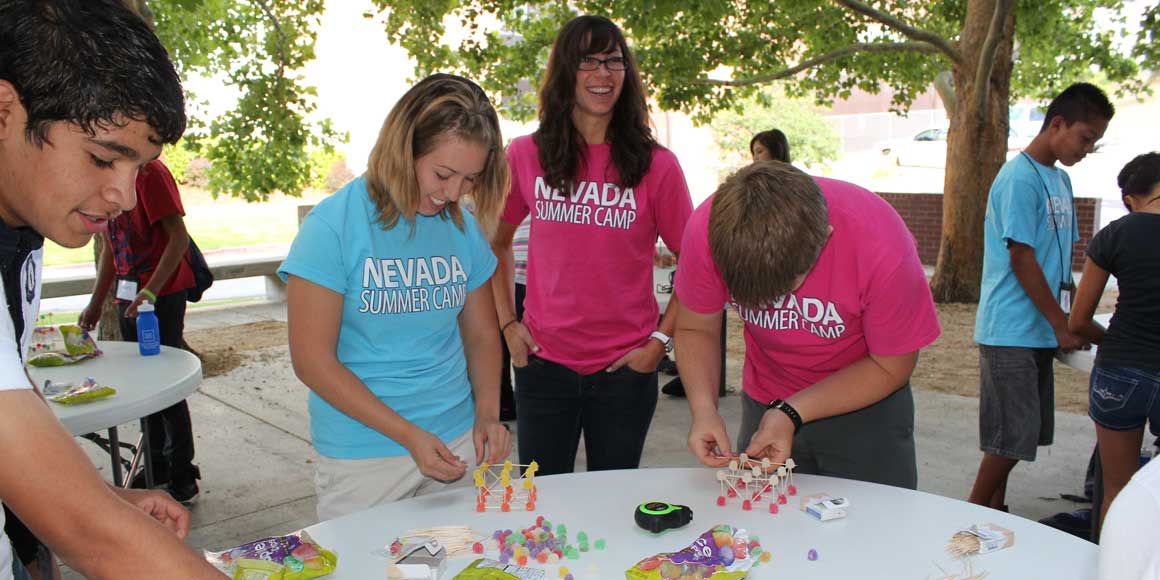The College of Engineering at the University of Nevada, Reno, has been awarded a grant from the National Science Foundation to study interest and identity development in middle school students attending their summer camps.
The research, which is in its second year, includes focus groups and a survey to determine what campers are looking to obtain from their camp experiences. The results of the study will be used to impact STEM programs in the Northern Nevada region, and extend to Southern Nevada and Northern California, through the College of Engineering outreach programs, and also the K-12 community.
"When it comes to engineering identity, we want to research if someone can see themselves as engineers. It's important to younger students' time in college and their future careers," said Indira Chatterjee, principal investigator of the grant and Associate Dean of Engineering.
The study is a collaboration with Adam Kirn, the local mentor and first faculty member in engineering education, and Jennifer Amos from the University of Illinois, Urbana-Champaign as the primary research mentor. Graduate student Tim Robinson is also a part of the project, and said that after the first year of data collection, there is a positive effect on student's attitudes in relation to engineering, along with an increase of interest in the field.
"We chose these camps to study because we wanted to know how they serve the students, and if it influences how students see themselves now compared to later [in college]," Kirn said. "We wanted to see what keeps them open and interested in engineering."
Kirn says that the curriculum modifications that are new to the camps this year include biomedical engineering, due to the University's fairly new offering of the major.
Registration for this year's camp program opened on Friday, February 22, and features a new extended hours program for working parents, which will run from 7:30 am to 5:30 pm. The camp runs from 9 am to 3 pm, and there are multiple camp options for interested students, in broad topics such as computer science, robotics, chemical and materials engineering, civil and environmental engineering. Each camp runs for a week, from June through July.
Other popular camps offered include the MESA First Generation engineering camp, which offers scholarships and is free to qualifying students, and the MakeHERS camps, where female mentors ranging from professional engineers, alumni, University faculty and current engineering students help girls discover the world of engineering. These two camps, along with a general introduction to engineering summer camp, will be the ones participating in the study.
The three camps in the study include diverse demographic groups, with students ranging in age, race, what school they attend and if they are first generation, or the first in their immediate family to be interested in attending college.
As the graduate assistant researcher, Robinson's job is to collect and analyze data and then write up the findings for publication, under the mentorship of more experienced researchers.
"It's exciting to see the student's knowledge about the profession and hear them talk about majoring in an engineering discipline when it comes to college," Robinson said. "Many of them even talk about how they now want to come to [the University] as a result of participation in the camp!"
The introductory level camps are designed to expose students to various disciplines within engineering through hands-on activities.
"Campers in the introductory camps will design, build and launch bottle rockets, participate in activities, in our earthquake lab, build mini speakers and learn the chemistry of tie-dye," said Claire Parker, K-12 Outreach Coordinator for the College of Engineering.
Engineering student Frances Vinlove has played an active role in the summer camps as a counselor since 2014.
"We teach various engineering lessons, help students with projects, have lunch with them, go on field trips and talk about what it's like to be an engineer," said Vinlove.
"For anyone interested in being a counselor, my advice is to be ready to have fun and work hard to make sure students have a great camp experience," she said.












